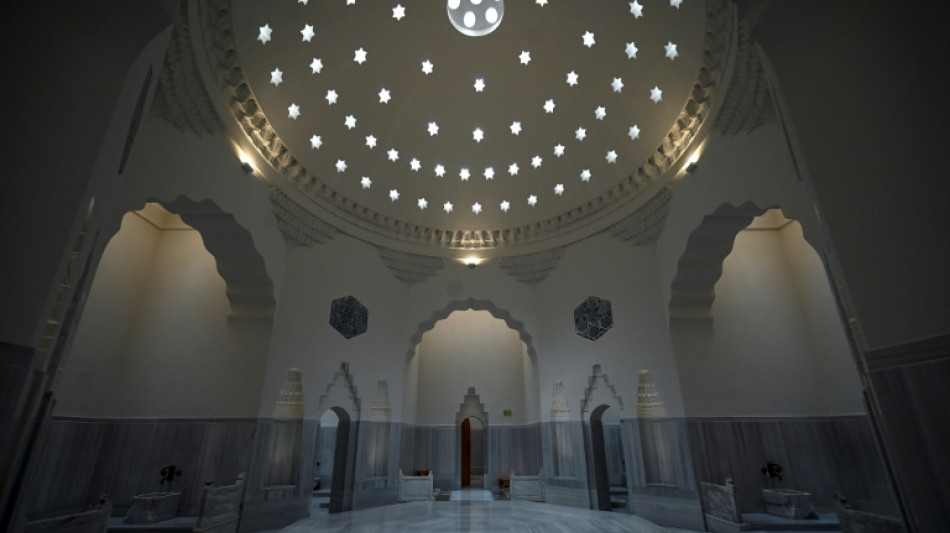
-
 Palestinians welcome ICC arrest warrants for Israeli officials
Palestinians welcome ICC arrest warrants for Israeli officials
-
Senegal ruling party wins parliamentary majority: provisional results

-
 Fiji's Loganimasi in for banned Radradra against Ireland
Fiji's Loganimasi in for banned Radradra against Ireland
-
New proposal awaited in Baku on climate finance deal

-
 Brazil police urge Bolsonaro's indictment for 2022 'coup' plot
Brazil police urge Bolsonaro's indictment for 2022 'coup' plot
-
NFL issues security alert to teams about home burglaries

-
 Common water disinfectant creates potentially toxic byproduct: study
Common water disinfectant creates potentially toxic byproduct: study
-
Chimps are upping their tool game, says study

-
 US actor Smollett's conviction for staged attack overturned
US actor Smollett's conviction for staged attack overturned
-
Fears rise of gender setbacks in global climate battle

-
 'World's best coach' Gatland 'won't leave Wales' - Howley
'World's best coach' Gatland 'won't leave Wales' - Howley
-
Indian PM Modi highlights interest in Guyana's oil

-
 Israel strikes kill 22 in Lebanon as Hezbollah targets south Israel
Israel strikes kill 22 in Lebanon as Hezbollah targets south Israel
-
Argentina lead Davis Cup holders Italy

-
 West Bank city buries three Palestinians killed in Israeli raids
West Bank city buries three Palestinians killed in Israeli raids
-
Fairuz, musical icon of war-torn Lebanon, turns 90

-
 Jones says Scotland need to beat Australia 'to be taken seriously'
Jones says Scotland need to beat Australia 'to be taken seriously'
-
Stock markets push higher but Ukraine tensions urge caution

-
 IMF sees 'limited' impact of floods on Spain GDP growth
IMF sees 'limited' impact of floods on Spain GDP growth
-
Fresh Iran censure looms large over UN nuclear meeting

-
 Volkswagen workers head towards strikes from December
Volkswagen workers head towards strikes from December
-
'More cautious' Dupont covers up in heavy Parisian snow before Argentina Test

-
 UK sanctions Angola's Isabel dos Santos in graft crackdown
UK sanctions Angola's Isabel dos Santos in graft crackdown
-
Sales of existing US homes rise in October

-
 Crunch time: What still needs to be hammered out at COP29?
Crunch time: What still needs to be hammered out at COP29?
-
Minister among 12 held over Serbia station collapse

-
 Spurs boss Postecoglou hails 'outstanding' Bentancur despite Son slur
Spurs boss Postecoglou hails 'outstanding' Bentancur despite Son slur
-
South Sudan rejects 'malicious' report on Kiir family businesses

-
 Kyiv claims 'crazy' Russia fired nuke-capable missile
Kyiv claims 'crazy' Russia fired nuke-capable missile
-
Australia defeat USA to reach Davis Cup semis

-
 Spain holds 1st talks with Palestinian govt since recognising state
Spain holds 1st talks with Palestinian govt since recognising state
-
Stock markets waver as Nvidia, Ukraine tensions urge caution

-
 Returning Vonn targets St Moritz World Cup races
Returning Vonn targets St Moritz World Cup races
-
Ramos nears PSG return as Sampaoli makes Rennes bow

-
 Farrell hands Prendergast first Ireland start for Fiji Test
Farrell hands Prendergast first Ireland start for Fiji Test
-
Gaza strikes kill dozens as ICC issues Netanyahu arrest warrant

-
 Famed Berlin theatre says cuts will sink it
Famed Berlin theatre says cuts will sink it
-
Stuttgart's Undav set to miss rest of year with hamstring injury

-
 Cane, Perenara to make All Blacks farewells against Italy
Cane, Perenara to make All Blacks farewells against Italy
-
Kenya scraps Adani deals as Ruto attempts to reset presidency

-
 French YouTuber takes on manga after conquering Everest
French YouTuber takes on manga after conquering Everest
-
Special reunion in store for France's Flament against 'hot-blooded' Argentina

-
 'World of Warcraft' still going strong as it celebrates 20 years
'World of Warcraft' still going strong as it celebrates 20 years
-
Fritz pulls USA level with Australia in Davis Cup quarters

-
 New Iran censure looms large over UN nuclear meeting
New Iran censure looms large over UN nuclear meeting
-
The first 'zoomed-in' image of a star outside our galaxy

-
 ICC issues arrest warrants for Netanyahu, Gallant, Deif
ICC issues arrest warrants for Netanyahu, Gallant, Deif
-
Minister among 11 held over Serbia station collapse

-
 Historic gold regalia returned to Ghana's king
Historic gold regalia returned to Ghana's king
-
Kyiv accuses Russia of launching intercontinental ballistic missile attack


Turkey scrubs up its baths to keep hammam tradition alive
For centuries, hammams were central to Ottoman society, and while they mostly fell out of use with the advent of running water, many in Turkey are being restored to revive an ancient ritual bathing tradition.
A mainstay of old Turkish films, hammam scenes were highly entertaining, a free space where women would socialise, eat, drink and even dance.
Last year, Istanbul's 500-year-old Zeyrek Cinili Hammam -- built during the reign of Suleiman the Magnificent by the celebrated Ottoman architect Sinan -- reopened after a painstaking 13-year restoration.
Alongside a functioning hammam, it also houses a museum explaining its history and the Ottoman ritual of bathing.
"The restoration somehow turned into an archaeological dig" that gave insight into how the hammam once looked, museum manager Beril Gur Tanyeli told AFP.
"Around 3,000 pieces of missing tiles were found which helped solve the puzzle of why this hammam was called Cinili" -- Turkish for "covered with tiles".
The beautiful Iznik tiles that once lined its walls were exclusively produced for the hammam. No other bathhouse had such a rich interior, museum officials say.
Although most were damaged by fires or earthquakes, or sold off to European antique dealers in the 19th century, some are still visible.
The restoration also exposed several Byzantine cisterns beneath the hammam.
"Sinan the Architect is believed to have built the hammam on top of these cisterns to use them as a foundation and as a source of water," Tanyeli said.
- From cleansing to celebration -
In ancient Rome, bathing culture was very important and it was "traditional for traders to wash before entering the city, especially in baths at the (city) entrance," archaeologist Gurol Tali told AFP.
During the Ottoman empire, a golden age for bathhouses, the ritual symbolised both bodily cleanliness and purity of soul.
In Islam, a Muslim must wash before praying, in an act known as ablution.
Hammams were also a place for celebrating births and weddings.
"Baths were used not only for cleansing the body but for socialising, relaxing, healing and even celebrating important life events," with special rites for brides, soldiers and young boys before they were circumcised, Tali said.
Since households at the time did not have running water, hammams were an essential part of life until the 19th century, with census figures from 1638 showing there were 14,536 public and private baths in Istanbul, the museum said.
And that tradition has survived until today.
"You come here to get clean and leave handsome," said Zafer Akgul, who was visiting a hammam in the city with his son, telling AFP he visited often, particularly during religious feasts or for a wedding.
"We don't want this tradition to die."
- 'Passing on cultural heritage' -
That is where Istanbul's ancient hammams can serve a bigger purpose, Tali said.
"Restoring historical baths in Istanbul and putting them to use may be the most effective way to transfer cultural heritage to future generations," he said.
Another nearby bathhouse from the same era, the Bayezid II Hammam, underwent years of restoration and reopened as a museum in 2015.
One of the largest hammams in the city at the time, some historians believe it was where a notorious male bathing attendant, or "tellak", called Halil plotted an uprising in 1730 that overthrew Sultan Ahmed III.
For Manolya Gokgoz, who does publicity for Cemberlitas Hammam, another 16th-century bathhouse built by Sinan, the connection is more personal: her grandmother worked there as a "natir" -- a woman's bathing attendant.
"When I was two or three years old, I would go to the baths in the morning, wash and play by myself until the evening without getting bored," she told AFP.
For Gokgoz, the tradition lives on -- although mostly among tourists, which for her is a shame.
"In the past, we used to go to the hammam with our mothers and grandmothers. Now 70 percent of our customers are foreign tourists and 30 percent locals," she said.
These days, the full hammam experience -- which lets bathers relax in hot, warm or cool pools alongside extras like massages or peeling -- is expensive, with the basic service costing around $100.
Celebrities, both Turkish and international, often visit Cemberlitas, with the last being Spanish actor Pedro Alonso -- the character Berlin in the Netflix hit "Money Heist" -- visiting in September.
"Hammam is not a luxury, but a need," Gokgoz said.
"Yes, it's not like in the past because we have hot water at our fingertips, but we need to keep this tradition alive."
J.Fankhauser--BTB

